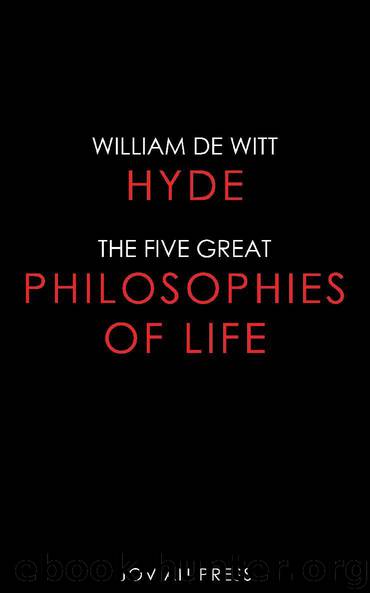The Five Great Philosophies of Life by William de Witt Hyde

Author:William de Witt Hyde
Language: eng
Format: epub
Publisher: Jovian Press
THE ARISTOTELIAN SENSE OF PROPORTION
~
I
ARISTOTLE’S OBJECTIONS TO PREVIOUS SYSTEMS
OUR PRINCIPLES OF PERSONALITY THUS far, though increasingly complex, have all been comparatively simple. To get the maximum of pleasure; to keep the universal law; to subordinate lower impulses to higher according to some fixed scale of value, are all principles which are easy to grasp and by no means difficult to apply. The fundamental trouble with them all is that they are too easy. Life is not the cut-and-dried affair which they presuppose. A man might have a lot of pleasure, and yet be contemptible. He might keep all the commandments, and yet be no better than a Pharisee. Even Plato’s principle in actual practice has not always escaped the awful abyss of asceticism.
In opposition to Epicurus Aristotle says, “Pleasure is not the good and all pleasures are not desirable. No one would choose to live on condition of having no more intellect than a child all his life, even though he were to enjoy to the full the pleasures of a child. With regard to the pleasures which all admit to be base, we must deny that they are pleasures at all, except to those whose nature is corrupt. What the good man thinks is pleasure will be pleasure; what he delights in will be truly pleasant. Those pleasures which perfect the activity of the perfect and truly happy man may be called in the truest sense the pleasures of a man. The pleasure which is proper to a good activity is therefore good; that attached to a bad one is bad. As, then, activities differ, so do the pleasures which accompany them.”
In our discussion of Epicureanism we saw that the principle of pleasure consistently carried out produced bad results, and, as in the case of Tito Melema, developed the most contemptible character. Aristotle shows conclusively why this must be so. Pleasure is the sign and seal of healthful exercise of function. A life which has all its powers in effective and well-proportioned exercise will, indeed, be a life crowned with pleasure. You cannot, however, reverse this proposition, as the Epicurean attempts to do, and say that a life which seeks the maximum of pleasure will inevitably have the healthy and proportionate exercise of function as its consequent. According to Aristotle healthy exercise of function in a well-proportioned life in devotion to wide social ends and permanent personal interests, is the cause of which happiness is the appropriate and inevitable effect. Seek the cause and you will get the effect. Seek directly the effect, and you will miss both the cause you neglect and the effect which only the cause can bring. The criticism which we quoted from George Eliot on the career of Melema is the quintessence of the Aristotelian doctrine. To put it in a figure: Build a good fire and warm your room, and the mercury in the thermometer will rise. The cause produces the effect. But it does not follow that because you raise the mercury
Download
This site does not store any files on its server. We only index and link to content provided by other sites. Please contact the content providers to delete copyright contents if any and email us, we'll remove relevant links or contents immediately.
The remains of the day by Kazuo Ishiguro(7552)
Tools of Titans by Timothy Ferriss(6950)
The Black Swan by Nassim Nicholas Taleb(6192)
Inner Engineering: A Yogi's Guide to Joy by Sadhguru(5897)
Giovanni's Room by James Baldwin(5880)
The Way of Zen by Alan W. Watts(5800)
The Six Wives Of Henry VIII (WOMEN IN HISTORY) by Fraser Antonia(4791)
The Power of Now: A Guide to Spiritual Enlightenment by Eckhart Tolle(4756)
Astrophysics for People in a Hurry by Neil DeGrasse Tyson(4620)
Asking the Right Questions: A Guide to Critical Thinking by M. Neil Browne & Stuart M. Keeley(4576)
12 Rules for Life by Jordan B. Peterson(3734)
The Ethical Slut by Janet W. Hardy(3504)
Skin in the Game by Nassim Nicholas Taleb(3462)
Housekeeping by Marilynne Robinson(3402)
The Art of Happiness by The Dalai Lama(3385)
Double Down (Diary of a Wimpy Kid Book 11) by Jeff Kinney(3276)
Skin in the Game: Hidden Asymmetries in Daily Life by Nassim Nicholas Taleb(3264)
Walking by Henry David Thoreau(3235)
12 Rules for Life: An Antidote to Chaos by Jordan B. Peterson(3204)
